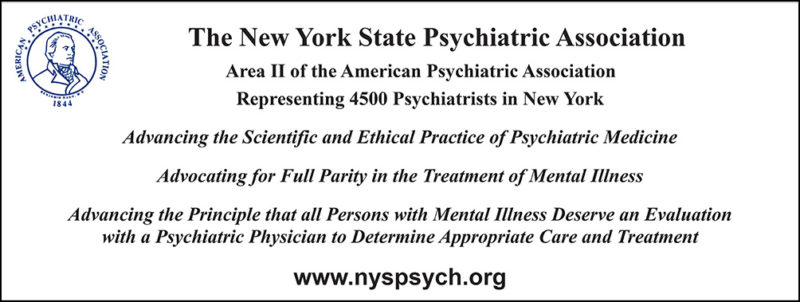For many years, the New York State Psychiatric Association (NYSPA) has been advocating for mental health parity – equivalent coverage and reimbursement for the treatment of mental health and substance use disorders. In addition to Timothy’s Law, New York’s mental health mandate, and the federal Mental Health Parity and Addiction Equity Act, recent legislative successes have allowed New York to make great strides towards full parity implementation. The Behavioral Health Insurance Parity Reforms (BHIPR), a comprehensive overhaul of the New York Insurance Law included in the 2019-20 New York State Budget, mandated coverage for all mental health conditions, substance use disorders and autism spectrum disorders by individual plans, group plans and HMOs. Other recent victories include the Mental Health and Substance Use Disorder Parity Report Act, enacted in 2018, which requires plans to implement formal parity compliance plans along with regular reporting to the state. NYSPA’s advocacy and support was critical in the enactment of these important measures.

The next frontier will be to guarantee parity for mental health and substance use disorder services provided by telehealth, both from a coverage and reimbursement perspective. NYSPA is committed to advocating for unrestricted access to telehealth and full parity in telehealth reimbursement from all payers.
In January 2021, Governor Cuomo included language in his Executive Budget proposals intended to expand access to telehealth for all New Yorkers. If adopted as part of the Fiscal Year 2022 Executive Budget, these proposals would codify reforms and relaxations previously authorized under gubernatorial executive orders issued in response to the COVID-19 public health emergency. The New York State Executive Budget must be enacted by April 1 and at the time of this writing, the following proposals are still pending.
- Provisions confirming that individuals with Medicaid coverage may receive telehealth services wherever they are located. Although temporarily waived during the public health emergency, federal rules currently prohibit coverage of telehealth services to a patient not in an originating site (e.g., physician office, hospital or other health care facility). This proposal would seek to ensure that all individuals covered by the Medicaid program are eligible to participate in telehealth from the safety of their homes.
- An interstate licensure program with other contiguous states and states in the Northeast region to permit practitioners in other states to provide telehealth to individuals in need of services located in New York. Traditionally, New York has chosen not to participate in any interstate licensing compacts.
- A requirement that commercial health plans maintain an adequate network of professionals to provide access to telehealth for all services covered under the plan.
- A mandate that telehealth be reimbursed at rates that incentivize use, when medically appropriate.
- The requirement for Medicaid coverage for audio-only telehealth services, when medically appropriate.
NYSPA has been carefully monitoring the budget proposals and engaging with legislative members and their staff. While we support many of the initiatives and their intent, the proposals simply do not go far enough to ensure widespread access to telehealth and reimbursement parity for telemedicine services across all payers. Simply put, medical care and treatment provided via telehealth modalities should be reimbursed at the identical levels as those services provided in-office. This principle must be applied across the board with respect to commercial insurers, the Medicaid Fee-for-Service program and Medicaid Managed Care. According to budget testimony submitted by the Medical Society of the State of New York,1 a survey of New York physicians conducted by one of its partner organizations revealed that only 23% of health plans reimburse telehealth visits at the same rate as in-person visits. Additional survey results indicated that audio-video telehealth visits are often reimbursed at only 30% of in-office visits while audio-only are reimbursed at 80% of their in-office counterparts. The failure to secure full reimbursement parity for telehealth will jeopardize access to necessary care for those communities that will likely benefit the most from remote access due to challenges in transportation, child-care and flexibility in scheduling.
We strongly support the ability of individuals covered by the Medicaid program to access treatment via telehealth while remaining in their homes. New York law already permits telehealth services covered by commercial health plans and insurers to be provided to patients in a location other than an originating site. Some individuals may have difficulties with transportation or do not feel comfortable leaving their homes as a result of the public health emergency. This expansion would permit individuals to receive necessary mental health care and treatment without the need to travel to a separate location.
With respect to the interstate licensure compact provisions, we strongly urge the state to prioritize quality of care and ensure that any out-of-state health care professionals providing care and treatment to New York residents provide those services in accordance with scope of practice requirements currently in place under New York law. Further, we support a further expansion of interstate reciprocity to permit physicians licensed in the State of New York to continue to provide care and treatment to their patients via telehealth when the patient may be traveling outside of New York for business, vacation or an extended stay, where clinically appropriate. An essential component of this initiative includes ensuring insurance coverage for services provided by New York physicians to their patients while temporarily outside of New York.
NYSPA supports the establishment of a telehealth provider network but would caution that establishment of an out of state network of providers authorized to provide services to New York residents cannot be a valid reason to limit the ability of New York-licensed physicians to provide covered telehealth services where needed.
NYSPA also strongly supports a mandate that audio-only services provided to Medicaid beneficiaries be reimbursed at the same rate as all other telehealth services. This is a true access issue. During the pandemic, audio-only care was often the only option for those patients who could not engage in audio and video telehealth because they lacked the required video technology or lived in an area without reliable internet access. As noted by a coalition of state-wide physician groups in a joint letter on the budget proposals: “Across specialties, providers report that during the pandemic, audio only communications was often the difference between care and no care.”2 In order to ensure full and widespread access to care, mandates for coverage of audio-only services must apply to all payers, including Medicaid Managed Care plans and commercial insurer and health plans doing business in New York.
On the federal level, the American Psychiatric Association has advocated that audio-only psychiatric services be considered complete telehealth encounters and paid at the same rate as an in-person visit. Last Spring, the Centers for Medicare and Medicaid Services (CMS) ruled that audio-only telephone care would be covered for a significant portion of psychiatry services during the COVID-19 public health emergency. CMS further confirmed that it would provide coverage for psychotherapy add-on codes paired with evaluation and management telephone codes (99441, 99442, and 99443). Payment for the telephone codes was increased to match payments for similarly timed office and outpatient visits. NYSPA strongly supports continued coverage for audio-only services, both on a federal and state level, particularly after the end of the current public health emergency.
We are also very pleased to report that bills mandating parity in coverage and reimbursement for telehealth (S5505/A6256) have been introduced by the Chairs of the Senate and Assembly Health Committees Gustavo Rivera (D-Bronx) and Richard Gottfried (D-Manhattan), respectively, in both the New York State Senate and Assembly and are currently under committee review. NYSPA staff was closely involved in the development of these bills. The legislation would require health plans to reimburse a treating or consulting provider for telehealth services “on the same basis, at the same rate and to the same extent that the health care plan reimburses for the services when provided through in-person diagnosis, consultation or treatment.” Further, the bills confirm that copayments, coinsurance and deductibles may be applied to telehealth services only if they are at least as favorable as those applied to services not provided via telehealth. If signed into law, either as part of the FY 2022 State Budget or in separate legislation, these bills would confirm, once and for all, full parity in reimbursement for services provided by telehealth in New York State.
In addition to the pending legislation, NYSPA is also advocating for legislative action to ensure a uniform definition of telehealth in both the Public Health Law (which applies to Medicaid and HMOs) and the Insurance Law (which applies to commercial health insurers). At present, the definitions are slightly different. The Medicaid definition of telehealth includes audio-only services while the other laws do not. This is an important clarification to avoid confusion or potential inequalities that might arise from inconsistent statutory definitions. Finally, NYSPA supports legislation that would mandate that all payers permit beneficiaries to use of out-of-network benefits in connection with telehealth services.
The future success of telehealth and telemedicine in New York depends primarily on two factors, access and payment parity. In order to confirm that telehealth is a long-term and viable option for care, we must work together to ensure that government and third-party payers provide reimbursement for telehealth commensurate with reimbursement for in-office services. Audio-only services must be covered at the same rates to ensure that those with limited technology resources have the same access to quality care. Finally, we must remove the Medicaid originating site requirement and any other previously imposed barriers to care that prevent

Rachel A. Fernbach, Esq.
comprehensive access to necessary care and treatment.
Rachel Fernbach is the Deputy Director and Assistant General Counsel of the New York State Psychiatric Association, a division of the American Psychiatric Association and the medical specialty society of psychiatrists practicing in New York State. Ms. Fernbach is also a Partner at Moritt Hock & Hamroff LLP where she concentrates her practice in not-for-profit and mental health law. Ms. Fernbach also serves as Co-Chair of the MHNE Board of Directors, publisher of Behavioral Health News.
Footnotes
1. www.nysenate.gov/sites/default/files/medical_society_of_the_state_of _ new_york_mssny.pdf
2. Joint comments submitted by the Medical Society of the State of New York and other state-wide medical specialty societies, including NYSPA, regarding the Executive Budget proposals.




